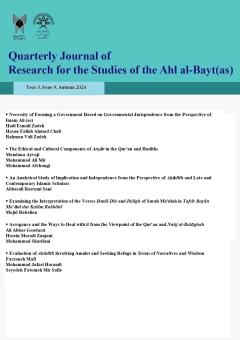Arrogance and the Ways to Deal with it from the Viewpoint of the Qur'an and Nahj al-Balāghah
Subject Areas : Quarterly Journal of Research for the Studies of the Ahl al-Bayt
Ali Abbas Goodarzi
1
![]() ,
Hosein Moradi Zanjani
2
*
,
Hosein Moradi Zanjani
2
*
![]() ,
Mohammad Sharifani
3
,
Mohammad Sharifani
3
![]()
1 - PhD student in Quranic Sciences and Hadith, Science and Research Branch, Islamic Azad University, Tehran, Iran.
2 - Assistant Professor, Department of Quranic Sciences and Hadith, Zanjan Branch, Islamic Azad University, Zanjan, Iran (corresponding author).
3 - Associate Professor, Faculty of Theology and Islamic Studies, Allameh Tabataba'i University, Tehran, Iran.
Keywords: Arrogance, Arrogant, Confrontation, Qur'an, Nahj al-Balāghah.,
Abstract :
Arrogance is a moral and social vice that is the root of some vices such as oppression, rebellion. This issue has been raised from two individual aspects (as a sensual vice) with the term arrogance in moral books and its social aspect (as a pestilence of authority) with the term arrogance in social and political texts. The findings of this research indicate that the phenomenon of arrogance is as old as the lifespan of humans on earth, and its scope includes all levels and members of society from the top to the bottom. The existence of individual backgrounds and talents is very effective in making people suffer from arrogance, and various social factors also play an important and significant role in intensifying and strengthening it. Teaching moral virtues and vices, introducing the practical forms of humility and explaining the consequences of arrogance can be considered as solutions to deal with the creation and intensification of this spirit in people.
القرآن الکریم، آیتی، عبدالمحمد (1374)، ترجمه قرآن کریم، تهران، انتشارات سروش، چاپ چهارم
نرم افزار جامع التفاسیر3، قم، مرکز تحقیقات کامپیوتری علوم اسلامی
نرم افزار دانشنامه علوی، قم، مرکز تحقیقات کامپیوتری علوم اسلامی
ابنعاشور، محمدطاهر(1420ق)، تفسير التحرير و التنوير، بیروت، مؤسسة التاريخ العربي، چاپ اول
آیتی، عبدالمحمد(1379ش)، ترجمه نهج البلاغه، تهران، دفتر نشر فرهنگ اسلامی، چاپ دهم
حقیقی، مصطفی(1388ش)، [مقاله روانشناسى¬اجتماعى¬استكبار]، پرتال¬جامع¬علوم و معارف قرآن، ص 2
راغب اصفهانی، حسین بن محمد(1416ق)، المفردات في غريب القرآن، بیروت، نشر دارالقلم، چاپ دوم
زمخشرى، محمود بن عمر(1407ق)، الكشاف عن¬حقائق¬غوامض¬التنزيل، بیروت، دارالكتاب العربي، چاپ سوم
سیوطی، عبدالرحمن(1404ق)، الدر المنثور فى التفسير بالماثور، قم، كتابخانه آیتالله مرعشى، چاپ سوم
طباطبايى، محمدحسين(1374ش)، ترجمه تفسيرالميزان، موسوی همدانی. قم، دفتر انتشارات اسلامی، چاپ چهاردهم
طبرسى، فضل بن حسن(1374ش)، ترجمه تفسير مجمع البيان، بیستونی، محمد، تهران، نشر فراهانى، چاپ دوم
طوسى، محمد بن حسن(1209ش)، التبيان في تفسير القرآن، بیروت، دار إحياء التراث العربي، چاپ اول
فخر رازى، محمد(1420ق)، التفسير الكبير(مفاتيح الغيب)، بيروت، دار إحياء التراث العربي، چاپ سوم
فراهیدی، خلیل بن احمد(1408.ق)، کتاب العین، بیروت، مؤسسة الأعلمي للمطبوعات، چاپ اول
قطب، سيد(1425 ق)، فى ظلال القرآن، بیروت، دار الشروق، چاپ هفدهم
قمى، على بن ابراهيم(1363ش)، تفسير القمي، قم، دار الكتاب، چاپ سوم
كاشانى، فتحالله(1351ش)، منهج الصادقين في إلزام المخالفين، تهران، کتابفروشی اسلامیه، چاپ سوم
نراقی، محمد مهدی(1388ش)، ترجمه جامع السعادات، فیضی،کریم، قم، نشر قائم آل محمد، جلد دوم
نراقی، ملا احمد(1348ش)، معراج السعادۀ،تهران، حوزه علمیه اسلامی، چاپ دوم

